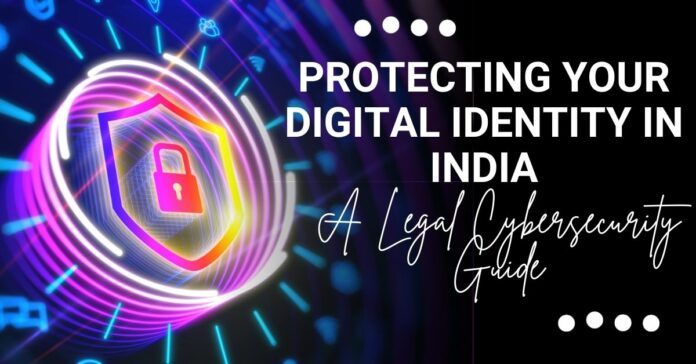In modern India, in which our lives are increasingly online, it is easy to feel crushed by means of the hazard of cybercrime. Your digital identification – all of your non-public information scattered throughout the internet – is sort of a treasure chest for hackers and scammers. But do not worry; you’re not to your own. This whole guide to cybersecurity is your roadmap to protecting your digital identity in India. We’ll spoil down the jail jargon and give you realistic suggestions. Furthermore, we will provide you with the assets you need to hold your digital identity stable and sound. Think of this guide as your non-public bodyguard in opposition to the atrocities of the digital age.
Table of Contents
Understanding Digital Identity and Its Legal Protection in India
Your digital identity is more than simply your call and online profile. It’s a mosaic of personal statistics, on-line bills, transaction histories, and even your surfing conduct. India’s criminal framework offers a few protection for this treasured asset:
1. The Information Technology Act, 2000 (IT Act): Laws Related to Data Privacy
The Information Technology (IT) Act of 2000 serves as the bedrock of India’s legal framework. This act is made to fight the ever-growing chance of cybercrime and alter the burgeoning sphere of e-trade. This landmark legislation establishes a based criminal surroundings for digital transactions even as additionally addressing the multifaceted demanding situations posed through cybercrime and making sure legal safety in India.
Encompassing a vast spectrum of cyber offenses, the IT Act casts an extensive net over illicit activities which include hacking, identification robbery, cyber terrorism, and statistics breaches.
To shield your digital identification in India, the bill objectives the subsequent:
- Section 43 explicitly addresses unauthorized get right of entry to and statistics theft, enforcing consequences on folks that engage in such activities.
- Section 66 tackles hacking, defining it as any act that causes loss or harm to the public or individuals.
- Furthermore, the misuse of digital signatures or unique identification capabilities, constituting identity theft, falls below Section 66C.
- Section 66E safeguards privacy by penalizing the capture, book, or transmission of pix of private areas of individuals without consent.
- Additionally, Section 67 addresses the ebook or transmission of obscene cloth in digital form.
The IT Act imposes stringent consequences to deter cybercrime, which include financial fines that may variety from ₹1 lakh to a superb ₹5 crores. Imprisonment terms additionally range relying on the severity of the offense, spanning from 3 years to existence imprisonment. These strong legal guidelines related to facts privacy underscore India’s commitment to upholding cybersecurity and protecting your digital identification in India.
2. The Personal Data Protection Bill (2023): Laws Related to Data Privacy
This groundbreaking legislative thought, stimulated by means of the comprehensive framework of the European Union’s General Data Protection Regulation (GDPR), seeks to empower you for protecting your virtual identification in India. Moreover, the Personal Data Protection Bill 2023 mandates stringent obligations upon groups entrusted with the collection, storage, and processing of such data. In addition to its middle provisions, this records privacy regulation in India ambitions to foster a balanced technique that helps protecting your digital identity in India. It prioritizes the following key objectives:
- The invoice seeks to enforce sturdy data protection measures with minimum disruption to present methods.
- The invoice ambitions to seriously enhance the convenience of living by streamlining processes and reducing regulatory burdens.
- The bill endeavors to create a conducive environment that helps and hastens the boom of India’s digital economy.
3. Other Relevant Laws Related to Data Privacy: Protecting Your Digital Identity in India
A prime example of India’s evolving regulatory framework is the Aadhaar Act, which meticulously governs the use of the unique identification number, a cornerstone of digital identity in the country. The Aadhaar number, with its large usage, has come to be intrinsically linked to an individual’s digital presence, underscoring the significance of information & complying with the Act’s provisions.
Under these laws, you have rights like the right to know what data is collected, the right to correct inaccuracies, and in some cases, the right to have your data deleted. All these rights cumulatively help you in protecting your digital identity in India.
Common Threats to Digital Identity in India: Protecting Your Digital Identity in India
Cybercriminals are consistently evolving their tactics, but some common threats in India include:
- Phishing Attacks: Install to Reveal: Picture this: you’re scrolling via your mailbox while you spot an e-mail that looks as if it is out of your financial institution. It urges you to click on a hyperlink to replace your account statistics. But wait! It’s a lure – a phishing attack designed to scouse and borrow your login credentials. In conclusion, phishing attacks include such fraudulent emails or messages that will trick you into revealing your sensitive information. Through this, the scammers install some malwares and then they hack into your system, accessing all the sensitive information saved.
- Identity Theft- Your Name, Their Game: Imagine waking up to find out someone’s been living your digital life, using your name to open credit cards, take out loans, or even commit huge crimes. That’s the nightmare of identity theft. Cybercriminals can snatch your personal information – like your Aadhaar number, PAN details, or even just your date of birth – and use it to impersonate you online. It’s like someone stealing your face and wearing it as a mask!
- Data Breaches- When Your Information Gets Leaked: Remember that time you signed up for a shopping website or used a new app? Did you ever wonder what happened to all that personal information you gave them? Unfortunately, sometimes that data isn’t as secure as we’d like. In this situation, hackers break into the systems of companies and organizations, grabbing massive amounts of user data – including yours. Suddenly, your email address, password, or even your bank details could be up for grabs on the dark web. Such is the horror of data breaches.
Also Read about the top 5 sophisticated scams that can happen to you!- Malware and Ransomware- The Digital Viruses: Think of malware and ransomware as the common cold and flu of the digital world. Malware is like a sneaky virus that infects your computer or smartphone, quietly stealing your data or spying on your activities. Ransomware on the other hand is even nastier – it locks you out of your own devices and demands a ransom to get back in. It’s like a digital kidnapping!
- Social Engineering- The Art of the Con: Cybercriminals aren’t always tech whizzes. Sometimes, they’re masters of manipulation. Social engineering is all about tricking you into giving up your information or clicking on dangerous links. They might pretend to be your bank, a government official, or even a friend in need, all to gain your trust and exploit it. It’s like a magic trick, however, instead of pulling a rabbit out of the hat, they’re pulling your passwords out of your brain!
In this situation, what do you do? How do you navigate your way out of this? What is the first thing that you should do for protecting your digital identity in India? Let’s find out!
What to Do If Your Digital Identity Is Compromised?
If you even have a tiny suspicion that someone has stolen your digital identity, it’s time to take swift action. There are certain steps you can take to ensure legal protection in India:
1. Report It Immediately

Firstly, report it immediately. Think of this as calling the digital police. Don’t hesitate to get in touch with your local cybercrime mobile or the Indian Computer Emergency Response Team (CERT-In). For example, in case you’re in Delhi, reach out to the Delhi Police’s cybercrime unit. In this example, your complaint might assist stop the thief from inflicting extra harm.
2. Alert Your Financial Institutions
Imagine someone going on a shopping spree with your credit card. To prevent this nightmare, inform your bank & credit card agencies right away. Call them right away so you can therefore freeze your money owed and prevent trouble with new cards, preserving your tough-earned money safe.
3. Change All Your Passwords
Imagine your online accounts as a residence with many doors. If a person has stolen the important thing to 1 door, it’s sensible to alternate the locks on all of the doorways. Update the passwords for all of your virtual accounts, in particular your email and monetary debts. Moreover, make certain to choose robust, specific passwords which might be tough to bet.
4. Monitor Your Statements Like a Hawk
Keep a near eye on your bank in addition to credit score card statements. Look for any transactions you don’t recognize, regardless of how small. If you see something fishy, record it in your financial institution or credit score card organization at once. This vigilant monitoring can help you in protecting your digital identity in India.
Remember, your digital identity is precious. Don’t let anyone else control it. By taking these steps, you can ensure legal protection in India and regain control of your online life.
What is the Government’s Approach to Protecting Your Digital Identity in India?
India’s ambitious goal of becoming a trillion-dollar digital economy by 2025 necessitates a strategic approach to data governance. Recognizing the fluid nature of the digital world and the rise in cases of scams and fraud, India is actively developing a dynamic digital ecosystem that fosters innovation while protecting individual data rights. By implementing strong data privacy laws in India, the government of India aims to empower you to protect your digital identity in India.

The rapid adoption of technology across India has amplified the importance of empowering users to control their personal data, especially in the realm of the digital world. Therefore, striking a balance between data rights and digital progress is crucial in this evolving landscape, where India envisions becoming one of the leading countries to develop digitally. This rapid rise in digitalization not only empowers individuals to participate actively in shaping data regulations but also advocates for their rights.
Escape these 5 scams that exploit you emotionally!!!Nevertheless, as India embraces the digital era, apprehensions regarding data misuse and the growing menace of cyber threats have come to the forefront. Moreover, empowering citizens with the necessary knowledge and tools to safeguard their personal information is not merely a choice but an imperative. It is the cornerstone of ensuring a safe, secure, and trustworthy digital environment for every individual in the nation.
India, despite not yet having a comprehensive data protection legislation, has proactively embarked on a strategic path toward robust data governance. This multifaceted approach to legal protection in India comprises three key pillars:
| Firstly, a dedicated focus on safeguarding personal data, |
| Secondly, the development of an innovative framework for non-personal data and |
| Thirdly, the formulation of well-defined policies for the responsible management of government data. |
This forward-thinking initiative signals India’s commitment to navigating the complexities of the digital era. It also simultaneously ensures the privacy & security of its citizens’ data.
Furthermore, by promoting awareness, education, and engagement, India is fostering a culture of data empowerment. Not only this empowers individuals to take control of their personal information but also actively participate in shaping data regulations. With collaborative efforts from stakeholders and policymakers, India is well-positioned to build a resilient and user-centric data protection landscape. It is a landscape that fuels its digital transformation journey. All in all, the GOI aims to build a robust system where you will be capable enough of protecting your digital identity in India.
Additional Resources and Tips: Protecting Your Digital Identity in India
Stay informed and empowered:
- Government Websites: Check the CERT-In website (cert-in.org.in) as well as the National Cyber Security Coordination Centre (ncsc.gov.in) for alerts and resources.
- Cybersecurity Organizations: Organizations like the Data Security Council of India (DSCI) provide valuable information and training.
- Helplines: Most states have cybercrime helplines you can call for assistance.
Remember, protecting your digital identity in India is an ongoing effort. Therefore, stay vigilant, educate yourself, and take advantage of the resources available to you.
In Conclusion
In India, your virtual privacy is blanketed by way of a complete criminal framework. These laws empower you with several rights, such as the right to be knowledgeable about what private facts is being collected about you, the right to rectify any inaccuracies to your statistics, and, in certain instances, the right to have your information erased entirely, thereby supporting you in protecting your digital identification in India. Moreover, these provisions ensure that you are not simply a passive difficulty of records series but an energetic player in handling your virtual footprint.
FAQs
Q. What is the law for data privacy and cybersecurity in India?
India’s primary law for data privacy and cybersecurity is the Digital Personal Data Protection Act (DPDP Act) 2023. Additionally, this law sets out the rights of individuals regarding their personal data & the obligations of organizations that collect and process such data.
Q. What is the cyber security policy of India?
The National Cyber Security Policy 2013 is India’s overarching policy framework for cybersecurity. It aims to create a secure and resilient cyberspace for citizens, businesses, and the government.
Q. How do we protect our digital identity?
In order to protect your digital identity, use strong and unique passwords, enable two-factor authentication (2FA)e, and be wary of phishing emails and suspicious links.
Q. Who regulates cyber security in India?
The Indian Computer Emergency Response Team (CERT-In) is the nodal agency responsible for cybersecurity in India. It runs under the umbrella of Ministry of Electronics and Information Technology (MeitY).
Q. Is cyber crime bailable?
Yes, cybercrime in India is applicable for anticipatory bail.
Q. What is the Digital Protection Act in India?
The Digital Personal Data Protection Act (DPDP Act) is the primary data protection law in India. It establishes a framework for the protection of personal data. It also protects the rights of individuals regarding their data. Furthermore, it protects the obligations of entities that collect and process personal data.
Q. Which is the cyber law in India?
The Information Technology Act 2000 (amended) is the main cyber law in India. It covers various aspects of cybersecurity, cybercrime, electronic commerce, and data protection that help you in protecting your digital identity in India.



